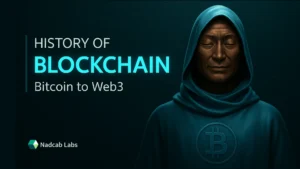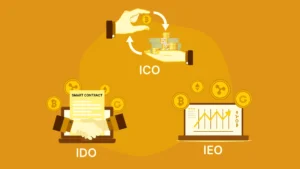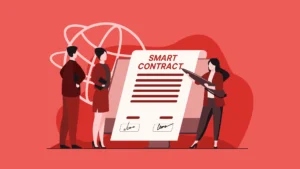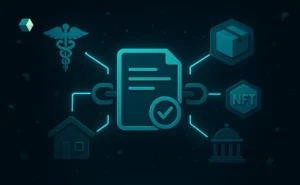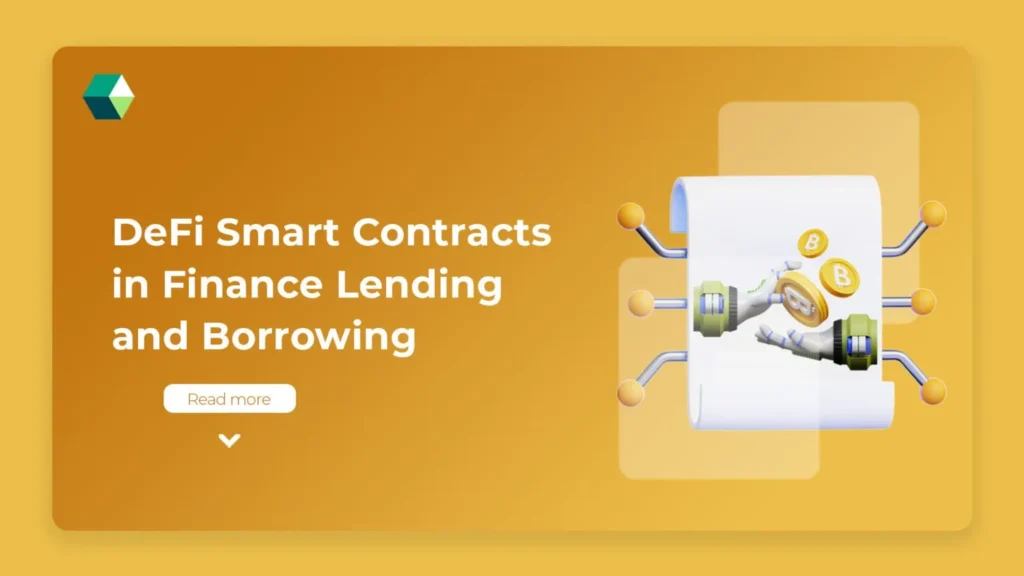
Decentralized finance (DeFi) has altered our relationship with finance, eliminating the traditional agents, banks and brokers. Smart contracts are the backbone of decentralized finance, automating the complex specificities of lending, borrowing, staking, organizing any financial contract you can conceive, yield farming, and more. In this blog, we will explore how smart contracts are transforming various lending and borrowing spaces in finance, exploring both applications and implications, as well as benefits and limitations..
Understanding DeFi Smart Contracts
An example of a DeFi smart contract can be thought of as a program on a blockchain – for instance, on a blockchain platform such as Ethereum, Binance Smart Chain, or Solana. Smart contracts would execute a contract between lenders and borrowers automatically, without the need for human involvement. For example, if a borrower provided collateral in cryptocurrency, then a smart contract could automatically provide a loan in stable coins and could enforce the terms of any repayments.
These contracts offer transparency and security–all transactions are recorded on the blockchain, and all parties have access to them.
How DeFi Smart Contracts Transform Lending and Borrowing
- Decentralized Lending Platforms
Particularly smart contracts are the driving force behind some of the most well-known lending protocols, like Aave, Compound, and MakerDAO. Smart contracts remove the requirement for paperwork, no more credit checks, and no more loan applications by all being replaced with automated activities on the blockchain. Rather than the hassle of paperwork and lengthy approval processes, all users do is deposit their digital assets into decentralized liquidity pools, which are managed by DeFi smart contracts. After users deposit their money, the smart contracts of those platforms will provide that deposited money to someone borrowing the money by locking in collateral, with the collateral being a crypto asset, such as ETH, DAI, or typically stable coins.
- Collateralization and Risk Management
Collateralization is a fundamental principle of DeFi lending. In this system, borrowers need to deposit Ethereum or other crypto assets into a DeFi smart contract as collateral before being allowed to borrow any funds. By requiring collateralization, the lending platform creates an underlying backing for borrowed funds, which helps to avoid defaults and protects lenders. The collateralized assets remain on the blockchain. If the borrower does not repay, the smart contract will automatically liquidate the collateral to cover the loss. This process illustrates how decentralized, code-managed risk creation can take away intervention, provide transparency, and fairness from the lender and the borrower.
- Yield Farming and Incentivizing Participation
Some DeFi platforms combine DeFi smart contract development services into DeFi yield farming, to encourage participation. By locking some assets into liquidity pools, users are rewarded typically with governance tokens or interest. The DeFi yield farming process acts as an incentive for lending and borrowing. By combining incentives for lending and borrowing it really becomes participatory and sustainable.
Advantages of DeFi Smart Contracts in Finance Transparency – Each lending and borrowing transaction can be verified on-chain.
- Security– Smart contracts are objective and prevent human error or manipulation.
- Efficiency– There is no paperwork, no middlemen—just execution via automation.
- Global Access– Anyone with an internet connection can participate.
- Higher Returns– Lenders typically earn better interest than through traditional banks.
Risks and Challenges
Like all smart contracts, DeFi smart contracts have great benefits but nothing is perfect.
- Audit and Security Expenses
DeFi smart contract audit fees can add up quickly–some typical fees are in the range of thousands to tens of thousands. If you pass on an audit and then suffer losses because of vulnerabilities or exploits, you may be wishing you had paid for an audit. Many projects hire well-known DeFi smart contract auditing firms before launching to assure their protocols are safe.
- Market Volatility
Due to the extreme fluctuations in crypto prices, collateral-based lending is heavily correlated to asset price movement and can result in loan liquidations and losses for the borrower.
- Uncertainty in Regulation
Governments are only now starting to realize what specific regulations should be in place for DeFi lending platforms. The risk of compliance factors could hinder how these services are used in other countries around the globe.
Related Use Cases and Applications
DeFi Smart Contract Mining
Traditional cryptocurrency mining typically involves attempting to solve exceedingly complicated mathematical puzzles that require disproportionate amounts of computational power. The processes behind DeFi smart contract mining, however, do not involve puzzle solving to the same extent as traditional mining operations. Instead of seeking to acquire expensive machines or using far-ranging amounts of electricity, users provide liquidity to decentralized protocols. When users lock their digital assets into liquidity pools, they are providing the lifeblood for decentralized exchanges, lending platforms and via other DeFi cryptocurrency applications. In return for liquidity provisioning, users are rewarded with tokens or potentially shared in transaction fees, and in many ways, DeFi smart contract mining can resemble “mining through staking.”
This approach has increasingly become a popular way to earn a return in recent years because most forms of mining can be seen as unsustainable, and is more accessible. DeFi smart contract mining typically requires no less technological expertise (or financial expertise) than traditional mining, but removes some of the obstacles that accompany traditional mining. Users have the opportunity to earn passive income from their holdings without any work, but many users see DeFi smart contract mining as multiple sources of revenue. DeFi smart contract mining is a way to play a role in supporting the emergence of decentralized ecosystems. Rewards for users are correlated with the liquidity they might provide, in other words, users are obtaining benefits while ensuring what remains a decentralized platform remains liquid, functional and efficient.
NFTs and Smart Contracts
A number of companies are now testing the use of NFTs as collateral in DeFi lending and offering NFTs as exclusive rewards in yield farming. This represents an expansion of the capabilities of NFTs, which had primarily been limited to digital skins or digital collectibles. NFTs can now serve as an integral finance asset class in decentralized spaces as NFTs are tied directly to DeFi. Embedded NFTs into lending protocols allows borrowers to provide income-generating capacity without the need to liquidate prized digital assets, and exclusive rewards would be allocated to yield farmers to facilitate more community engagement and participation.
Associative Development Companies
Companies often look for an associative DeFi smart contract development company, a partner that provides more than just coding. By definition, an associative company provides services such as consulting, auditing, and strategic services. An associative company may act as a partner across the entire spectrum of blockchain development. The ideal DeFi smart contract development company provides services that are tailored to all entrepreneurs (startups and enterprises), as well as Web3 projects.
Real-World DeFi Smart Contract Example
Assume that Alice is seeking to borrow $1,000 worth of stable coins. She deposits $2,000 worth of Ethereum in a DeFi lending protocol and the smart contract automatically locks her collateral and issues the loan.
- If Alice pays on time, the smart contract unlocks her Ethereum from it’s collateralization.
- If the price of Ethereum goes down too low, the smart contract partially liquidates part of her collateral in order to protect the lenders.
This simple yet powerful DeFi smart contract example illustrates the efficiency and security of blockchain-based lending.
The Future of DeFi Lending and Borrowing
As DeFi continues to be implemented, smart contracts will continue to improve. We can expect-
- Cross Chain lending protocols , allowing the use of assets from several different blockchains to act as collateral.
- NFT backed loans, where lending starts to expand into digital art and collectibles, rather than just fungible tokens.
- AI powered risk assessment, allowing for more informed automated decisions regarding collateral ratios and interest rates.
- The cost of audits for smart contracts shouldn’t change, but there should be better safeguards for investors to reduce the aggregate outlay for DeFi projects.
DeFi Smart Contracts Reshaping Tomorrow’s Finance
DeFi smart contracts are transforming the whole ecosystem for lending and borrowing and democratizing the financial system, meaning it is more open, transparent, and accessible to all who have an internet connection. DeFi smart contracts avoid intermediaries (aggregators, banks, brokers) that control transactions in traditional finance, instead building trust through coded contracts entirely powered by blockchain technology. DeFi smart contracts are enhancing alleys of value from yield farming services designed for investors to earn passive income, to NFT integration which allow for new ownership/utility, and experienced auditing solutions that keep pace with ecosystem security. DeFi smart contracts are revolutionizing the ways value moves throughout an industry by enabling instant settlement, lower transactional costs, and eliminating human error while building an ecosystem founded not on trust in centralized institutions, but on scalable, verifiable, immutable code that is autonomously executing.

